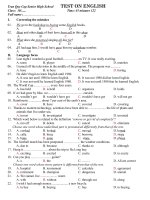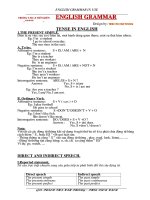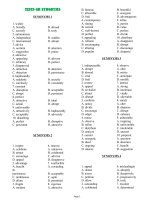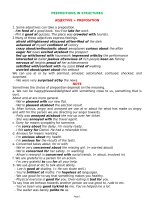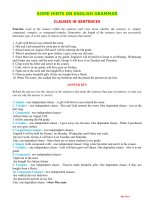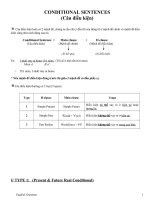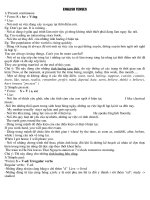Some Hints On English Grammar
Bạn đang xem bản rút gọn của tài liệu. Xem và tải ngay bản đầy đủ của tài liệu tại đây (199.89 KB, 17 trang )
SOME HINTS ON ENGLISH GRAMMAR
CLAUSES IN SENTENCES
Exercise. Look at the clauses within the sentence and write down whether the sentence is: simple; compound;
complex; or compound-complex. Remember...the length of the sentence does not necessarily determine type. It
is the types of clauses in the sentence that matter.
1. A girl with brown eyes entered the room.
2. Mai and Linh entered the room just as the bell rang.
3. School starts on August 25th and I will be entering the 8th grade.
4. When I purchased my new gym clothes, I gave away my old ones.
5. Since there are so many students in my grade, English 8 will be held for Group A on Monday, Wednesday
and Friday one week, and the next week, Group A will have it on Tuesday and Thursday.
6. Công wrote his letter and sent it to his cousin.
7. Linh, who is in my grade, will have gym on Fridays.
8. Ngân ran to the store and she bought five lottery tickets.
9. Flowers make beautiful gifts if they are bought from a florist.
10. When Thu came, she walked into my bedroom and she placed the present on my bed.
ANSWER KEY
Behind the answers are the clauses in the sentences that make the sentence that type of sentence, so that you
can see why the answer is correct.
1. Simple - one independent clause - A girl with brown eyes entered the room.
2. Complex - one independent clause - Mai and Linh entered the room. One dependent clause - just as the bell
rang.
3. Compound - two independent clauses -
School starts on August 25th
I will be entering the 8th grade.
4. Complex - one independent clause - I gave away my old ones. One dependent clause - When I purchased my
new gym clothes.
5. Compound-Complex - two independent clauses -
English 8 will be held for Group ! on Monday, Wednesday and Friday one week.
the next week, Group A will have it on Tuesday and Thursday.
Also, one dependent clause - Since there are so many students in my grade.
6. Simple (with compound verb) - one independent clause: Công wrote his letter and sent it to his cousin.
7. Complex - one independent clause - Linh will have gym on Fridays. One dependent clause - who is in my
grade.
8. Compound - two independent clauses -
Ngân ran to the store
she bought five lottery tickets
9. Complex - one independent clause - Flowers make beautiful gifts. One dependent clause: if they are bought
from a florist.
10. Compound-Complex - two independent clauses -
she walked into my bedroom
she placed the present on my bed
Also, one dependent clause - when Thu came
Bảo Thoa 1
SUBORDINATE (DEPENDENT) CLAUSE (ADJECTIVE)
A subordinate or dependent clause is a clause that does not make sense by itself, even though it has a
subject and verb. It needs the independent clause to make sense.
The dependent or subordinate clause can be used as an adjective, an adverb or a noun in a sentence. Therefore,
you need to know what word in the independent clause the dependent (subordinate) clause modifies - if it is an
adjective dependent (subordinate) clause or an adverb (subordinate) clause.
This sheet is about taking the dependent (subordinate) clause as an adjective subordinate clause. An adjective
dependent clause will modify a noun or pronoun in the independent clause. It is introduced by a relative
pronoun or conjunctive adverbs. The relative pronouns that introduce this clause are: who, whom, whose,
which, that. The conjunctive adverbs are: where, when.
Exercise Directions: In all of the sentences below, the dependent (subordinate) clause is an adjective one.
Write the clause on your paper and then tell what noun or pronoun it modifies. Remember, an adjective
answers the questions: which one, what kind, how many - so the adjective clause will as well.
1. There are many cities that have nicknames.
2. Dalat is a city that has the nickname of City of Flowers.
3. There are many people whose inventions improved our lives.
4. Madame Butterfly, which is an opera, was written by Puccini.
5. The girl whom we elected as our representative has done a good job.
6. The one who comes in first will win the prize.
7. I went to the store which is on the corner of Dong Khoi Street to buy the ice cream.
8. The place where we camp is about 10 miles from home.
9. The school could not hire a man whose record was so doubtful.
10. Do you know the time when the eclipse will occur?
ANSWER KEY
1. that have nicknames - modifies cities
2. that has the nickname of City of Flowers- modifies city
3. whose inventions improved our lives - modifies people
4. which is an opera - modifies Madame Butterfly
5. whom we elected as our representative - modifies girl
6. who comes in first - modifies the pronoun, one
7. which is on the corner of Dong Khoi Street - modifies store
8. where we camp - modifies place
9. whose record was so doubtful - modifies man
10. when the eclipse will occur - modifies time
SUBORDINATE (DEPENDENT) CLAUSE (ADVERB)
Subordinate or Dependent Clauses can also be used as an adverb would be used in a sentence. Remember
that an adverb answers the questions: when, where, how, why, and to what extent or degree. The whole
dependent clause can also answer those questions. When that dependent clause answers the questions: when,
where, how, why, it will modify the verb in the independent clause. When it answers to what extent or degree,
it will codify either an adjective or an adverb in the independent clause.
Bảo Thoa 2
Adverb clauses are introduced by:
Conjunctive Adverbs - when, whenever, where, wherever, while, before (not the preposition here, but an
adverb), until, after, "as" and "since" in relation to time.
Subordinate Conjunctions - as, if, as though, because, that, so that, in order that, if, unless, though, although,
than as (referring to manner or reason), since (referring to reason).
It is NOT important to identify the connective but it is important to know which word in the independent
clause that is modified by the Adverb subordinate (or dependent) clause.
e.g.
e.g. When we approached very quietly, the "ghost" disappeared.
The adverb dependent clause is: when we approached very quietly. It answers the question, when. It therefore
will modify the verb in the independent clause (disappeared).
e.g. Forecasters use very sensitive equipment so that they can make accurate observations.
The adverb clause is: so that they can make accurate observations. It answers the question, why. It modifies
the verb in the independent clause: use.
Exercise. Write down the dependent (or subordinate) adverb clause in the following sentences and tell what
word in the independent clause it modifies.
1. Whenever I see an airplane, I want to fly to Hanoi.
2. My sister follows me wherever I go.
3. She acts as though I should take her everywhere.
4. Mai cries because I will not take her.
5. My older sister is more patient with her than I am.
6. When the day is clear, I can see the top of the mountain.
7. Huế is my goal because I have always wanted to go there.
8. Residents can live as though winter does not exist.
9. Rubber tree cultivation spread as Dong Nai Province grew.
10. If the test results are approved, more oranges will be grown.
ANSWER KEY
1. whenever I see an airplane - modifies "want"
2. wherever I go - modifies "follow"
3. as though I should take her everywhere - modifies "acts"
4. because I will not take her - modifies "cries"
5. than I am - modifies "patient"
6. when the day is clear - modifies "can see"
7. because I have always wanted to go there - modifies "is"
8. as though winter does not exist - modifies "can live"
9. as Dong Nai Province grew - modifies "spread"
10. if the test results are approved - modifies "will be grown"
SUBORDINATE (DEPENDENT) CLAUSE (NOUN)
In this practice, the dependent or subordinate clause is used as a noun - that is, it will be used in a sentence as a
noun can be used, as the subject, direct object, etc.
e.g.
a. What he wrote was clear. What he wrote - subject
b. I don't know how he can be reached. how he can be reached - direct object
c. Give whoever answers the message. whoever answers - indirect object
Bảo Thoa 3
d. I sent the notice to whoever was interested. whoever was interested - object of preposition "to"
e. This is what I intend. what I intend - predicate noun
Words that introduce a noun clause:
how what where which whoever
if whatever wherever whichever whomever
that when whether who, whom why
Many words that introduce a noun clause can introduce other kinds of subordinate/dependent clauses. To tell
them apart, determine how they are used in the sentence.
e.g.
Phú noticed that the phone was buzzing.
Phú noticed what? - that the phone was buzzing - direct object
b. The phone that was buzzing was off the hook.
"that was buzzing" tells which phone was off the hook - thus, it is an adjective clause.
To decide whether to use "who" or "whom" in a noun clause, decide how the word functions in the noun
clause. As a subject in the noun clause, use "who" or "whoever." Use "whom" or "whomever" as the object of
the verb or the object of the preposition that is within the noun clause. Look for how the relative pronoun is
used in the clause....not how the clause is used in the sentence. The use of the pronoun tells you whether to use
who(ever) or whom(ever).
Exercise. Write down the subordinate/dependent noun clause in each sentence and tell how it is used in the
sentence.
1. You know that the telephone was ringing.
2. What you say can be recorded.
3. The sound waves carry the message to whoever is listening.
4. Basically, this is how a telephone works.
5. - 6. You can talk to whomever you like and say whatever you think. (There are two noun clauses in 5, so
make sure you get both.)
In this part of the exercise, identify the noun clause and tell which pronoun is correct.
7. (Whoever, Whomever) they choose will probably accept.
8. Tell me (who, whom) is likely to run for that office.
9. I will vote for (whoever, whomever) will do the best job.
10. The candidate chosen was exactly (who, whom) you predicted.
ANSWER KEY
1. that the telephone was ringing - direct object
2. what you say - subject
3. whoever is listening - object of preposition
4. how a telephone works - predicate noun
5 - 6. whomever you like - object of preposition; and, whatever you think - direct object
7. whomever they choose
8. who is likely to run for that office
9. whoever will do the best job
10. whomever you predicted
Bảo Thoa 4
RECOGNIZING ALL SUBORDINATE CLAUSE USES
Remember that a subordinate/dependent clause is one that does not make sense by itself and needs the
independent clause to make sense. Remember also that a subordinate/dependent clause can be used as an
adjective, an adverb or as a noun clause.
If you need a review of what they are, please return to the exercises on each of these uses of a
subordinate/dependent clause before you do the following exercise.
Exercise. Write the subordinate/dependent clause in the following sentences. Next to each one, write whether it
is an adjective clause, adverb clause or a noun clause. If an adjective or adverb clause, tell what word in the
independent clause is modified by that clause. If a noun clause, write how it is used in the sentence...that is,
whether it is the subject, direct object, object of preposition, indirect object or predicate noun.
1. Ancient Egyptians designed houses that were meant to be cool.
2. The architect who is my brother designed my home.
3. Before a proper foundation is designed, a soil test is done.
4. People who like tiny dogs have a choice of about fifteen kinds.
5. Whoever likes Shetland Sheepdogs will be happy with their choice.
6. Many people go to Saigon because there is always plenty to do.
7. Whenever I see an airplane, I want to travel.
8. Another question may be what the major issues are.
9. The skyline was spectacular as the sun set.
10. One group is made up of dogs that are bred as bird dogs.
ANSWER KEY
1. that were meant to be cool - adjective (which?) - modifies houses
2. who is my brother - adjective (which?) - modifies architect
3. before a proper foundation is designed - adverb (when?) - modifies verb phrase "is done."
4. who like tiny dogs - adjective (which?) - modifies people.
5. whoever likes Shetland Sheepdogs - noun - subject
6. because there is always plenty to do - adverb (why?) - modifies verb, go.
7. Whenever I see an airplane - adverb (when?) - modifies verb, want.
8. what the major issues are - noun - predicate noun
9. as the sun set - adverb (when?) - modifies verb, was.
10. that are bred as bird dogs - adjective (which?) - modifies dogs
SENTENCES
A sentence is a group of related words with a subject and verb that makes sense by itself.
Types of Sentences by Function:
1. Declarative (or telling) sentence - A sentence that is a statement. It is followed by a period. Example: Bill
gave his report to the teacher.
2. Interrogative sentence - A sentence that is a question. It is followed by a question mark. Example: Did you
know the answer?
3. Imperative sentence: A sentence that is a command or request. it is followed by a period. The subject is
always "you" understood. Example: Close the door. Please eat your food.
4. Exclamatory sentence: A sentence that expresses a feeling. It is followed by an exclamation mark or a
period. Example: Wow! What a great surprise!
Bảo Thoa 5
Exercise. Write down the type of each sentence. There are no end punctuation on these sentences because that
may give you the answer. Decide by the function of the sentence and mark down the end punctuation.
1. Are you aware of the appointment tomorrow
2. Eat your supper
3. Oh, what a beautiful morning
4. Today is my birthday
5. What gifts did you receive for your birthday
6. Pay the bill
7. Shh, don't make any noise
8. Have you finished your homework
9. Debby, turn off the light
10. Brian participated in the baseball tournament
ANSWER KEY
1. Are you aware of the appointment tomorrow? (interrogative)
2. Eat your supper. (imperative)
3. Oh, what a beautiful morning! (exclamatory)
4. Today is my birthday. (declarative)
5. What gifts did you receive for your birthday? (interrogative)
6. Pay the bill. (imperative)
7. Shh, don't make any noise! (exclamatory)
8. Have you finished your homework? (interrogative)
9. Debby, turn off the light. (imperative)
10. Brian participated in the baseball tournament. (declarative)
CONJUNCTIONS
A conjunction is a word that joins words, phrases or clauses.
Types of Conjunctions:
1. Coordinating Conjunctions - These conjunctions join words, phrases or clauses of equal function, like: 2 or
more subjects, 2 or more verbs, 2 or more direct objects, etc. They can join 2 or more phrases, or 2 or more
clauses, like 2 independent clauses or 2 or more dependent clauses. They are generally just a few of these
conjunctions and, if you memorize them, you will know when you see them and also know when you see
subordinating ones.
The coordinating conjunctions are: and, or, nor, but, yet and sometimes, for. (For is generally a preposition....so
be careful.)
2. Correlative Conjunctions - These conjunctions are paired conjunctions. (See the word, relative, in the
word, correlative? To be a relative, you need someone else, like a mom needs a daughter or son; grandma needs
grandchildren, etc. So these conjunctions need the two or paired conjunctions.) They are used together, and
they are used in the same positions as the above coordinating conjunctions.
The correlative conjunctions are: either...or; neither...nor; both...and; not only...but; not only...but also;
whether...or; just as...so
3. Subordinating Conjunctions: These conjunctions join clauses of unequal function, like an independent
clause and a dependent (or subordinating) clause. There are many of these, but here are a few of them: after,
although, as, as if, as long as, as though, because, if, since, so that, than, unless, until, when, whenever,
where, whereas, while.
Bảo Thoa 6
